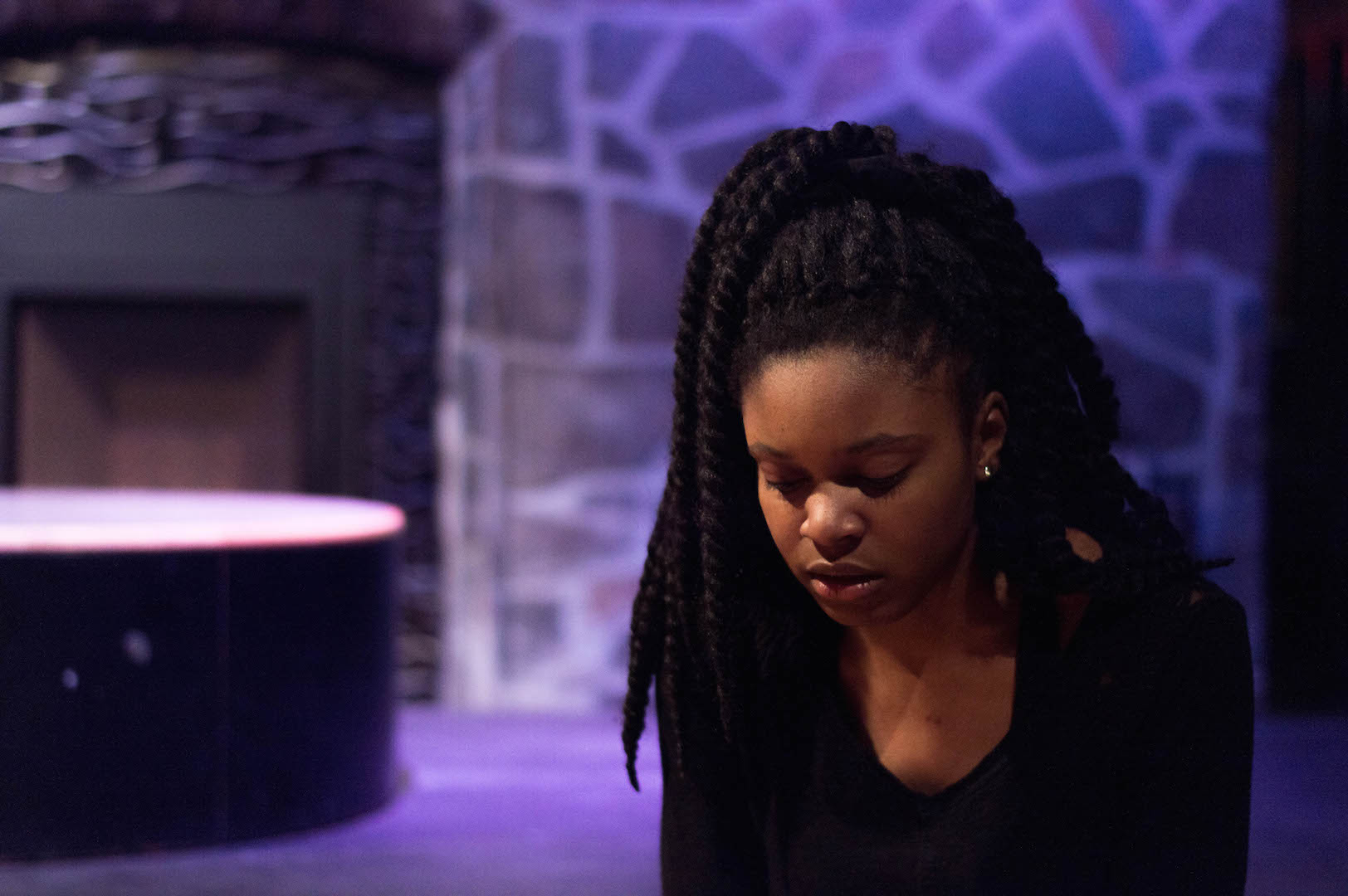By Zoe Lesser
The standard, fluorescent, lights of Falstaff’s fade into a dark purple hue cast on the stage and this Skidmore campus hallmark is immediately transformed. The stage is bare, with a circular platform in the middle—a minimalist, ambiguous, set that will allow the actors and their stories to take all of the focus. South African music blares from the speakers. Lively, rhythmic, dynamic, the music beckons dancing and piques curiosity. As the play begins, the lights fade and recordings of poems written by the actors are played, inviting the audience into the minds of the actors.
VOX: WOM(A)N, directed by Lebo McKoena ’18, is a devised piece that serves as an exploration of womanhood. It addresses the milestones inherent in growing up as a woman, and the different ways of coping with them. The text is created entirely by the actors, McKoena, and other, outside writers. The result is a truly original piece that is unique to the specific group of woman at this time and place. Using poetry, music, and movement, an ensemble of six women reflects on how they have grappled with a variety of different aspects of womanhood.

VOX: WOM(A)N Ensemble, Photo by Dante Haughton ’19
One by one, each actor enters the stage, living the reality of the previously played poems. The piece peers into specific moments of growing up for this ensemble of woman, while maintaining a wider frame for dialogue. The first scene concludes with each actor musing on the prompt “I thank you.” They speak over each other, expressing to whom or what they are thankful, with extreme fervor and intensity, as they depart one by one.
The piece weaves together instances of group reflection like this one, and more private, personal, moments. Starr Philipps ’19 enters the stage alone, musing on the idea of having the most fun doing nothing. Her tone is innocent and playful as she reminisces on times when she has felt the most at ease. Beny Benson ’18 holds a picture frame to her body on a platform, explaining that she has been plucked from the another place, and feels as though she is in a museum, with tourists ogling at her. Ziggy Schulting ’18 confides in the audience about what it is like to miss a close friend, and its accompanying feelings of loss and regret. These narratives are melded together in a way that allows the audience to examine the actors’ minds individually more deeply, while still being affected by the ensemble as a whole.

Starr Phillips ’19, Photo by Dante Haughton ’19
The play seamlessly fuses together spoken word with dance and music. While the audience hears a poem about two strangers sharing an intimate moment on a train, we see choreographer and performer Zimkita Mpumpula ‘17 express the story through dance. She embodies the claustrophobia of the train and a brief moment of intimacy with specific, evocative, movements. Her choreography interprets the poem in a way that sheds light on the beauty and ephemeral reality of the situation, while accurately depicting the story. Mpumpula conveyed her character’s excitements, revelations, and loneliness with the type of vulnerability unique to dance.
Scenes that include the entire ensemble on stage bring the audience back to the idea of communal womanhood. Whether they are all extolling on a given prompt or exploring the space together, they inspire feelings of confusion, frustration, clarity, and release. The experiences of these women are diverse; they have all been dealt very different sets of circumstances and have drawn different conclusions from the challenges they face. Yet, in the closing moment of the piece, they unite in their shared experience of womanhood, stating in unison “you strike a woman, you strike a rock.”
Photo Gallery
Directed by: Lebo McKoena ’18
Stage Manager: Ariella Hakim ’17
Ensemble: Antonia Benson ’18, Amelia Power ’20, Brittany Kent ’18, Cara Geser ’20, Starr Phillips ’19, and Ziggy Schulting ’18








